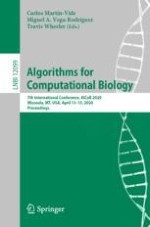2020 | OriginalPaper | Buchkapitel
A Topological Data Analysis Approach on Predicting Phenotypes from Gene Expression Data
verfasst von : Sayan Mandal, Aldo Guzmán-Sáenz, Niina Haiminen, Saugata Basu, Laxmi Parida
Erschienen in: Algorithms for Computational Biology
Aktivieren Sie unsere intelligente Suche, um passende Fachinhalte oder Patente zu finden.
Wählen Sie Textabschnitte aus um mit Künstlicher Intelligenz passenden Patente zu finden. powered by
Markieren Sie Textabschnitte, um KI-gestützt weitere passende Inhalte zu finden. powered by
